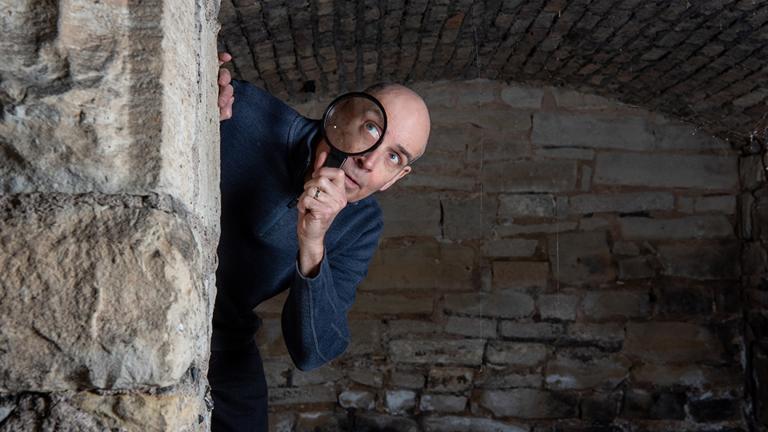Baseball Playoffs
Rich Samuels reports on the baseball frenzy here in Chicago.
Economic Bailout
The credit crunch hits home as banks are freezing lines of credit, denying mortgages and car loans even to those with good credit. Elizabeth Brackett tells us what some local economists have to say.
Bob Schieffer
Legendary CBS newsman Bob Schieffer talks with Carol Marin about the upcoming debates, journalism today and his new book "Bob Schieffer's America."
Excerpt from Bob Schieffer's America
PREFACE
This is a book of short essays about life, liberty and the pursuit of news. The vast majority of the pieces found here were the "final thoughts" that I began writing in 1994 to tack on the end of our Face the Nation broadcasts. "Final thoughts" is a misnomer, of course. If writing these pieces has taught me anything, it is that no thoughts should be final, especially mine. While most of them were written over the last fourteen years, a few of the somewhat longer ones go back to the 1970s, when I wrote weekly opinion pieces for CBS Radio.
Within this collection is to be found everything from reflections on war and peace to advice to fathers on how to "act normal."
The partisans of the hard right and left who seem to have no purpose but to prove the rightness of their cause will discover little of interest here. I find the professional screamers and their checklists of what constitutes a "liberal" or "conservative" predictable to the point of boredom. As I listen to their arguments on the cable channels and their unwillingness to give an inch on any issue, I still long for the day when someone on one side responds to someone on the other side by saying, "What an interesting point. You may be right." I'm still waiting, but I am not holding my breath.
I have always believed the greater and more intellectually challenging search is finding the things that bring us together rather than the differences that drive us apart.
In these essays, I have tried to follow the rule laid down by my great teacher Eric Sevareid to "elucidate, when one can, rather than advocate."
But I have tried, as well, never to forget his admonition "to retain the courage of one's doubts as well as one's convictions in this world of dangerously passionate certainties."
Most of the time, these essays are simply observations— snapshots of my thinking— about America and Americans and how we came to be who and what we are.
Over the years I have found more to celebrate than to lament about America. To be sure, there was plenty to criticize, including the failure of government in the wake of Katrina, the foolishness of a government bureaucracy so big and cumbersome that it sometimes was unable to get out of its own way and government in which political spin had become so ingrained that at times its officials could no longer even recognize the truth, let alone tell it.
But again and again, I would see evidence of the innate good sense and optimism that is so much a part of the American character. No matter the challenge, somehow Americans have always been willing to meet it, and somehow we have always found a way. That part has never changed.
I became moderator of Face the Nation in 1991, but the first of the Sunday commentaries did not appear until an April Sunday in 1994, on the weekend after Richard Nixon died.
On that Sunday, we covered the news of the day as we always did, then a panel of Nixon's aides reminisced about the highlights and lowlights of Nixon's time in the White House. I felt the program that day needed "a button," as we call it in the trade, a sentence or two that sums up or puts in context what has just been seen and heard. So I wrote the following and read it at the conclusion of the broadcast:
We end this morning with a personal note. Richard Nixon had been around so long he had become as much a part of the American landscape as the Washington monument. Now that he's gone, it's a little like looking out the window and discovering the monument is no longer there. It's going to take all of us a little while, I suspect, to adjust to the new landscape.
Nixon did some grand things and he did some dastardly things that greatly disappointed those who had placed their trust in him. But Richard Nixon's life is a reminder that we can learn from the imperfect as well as the perfect. Richard Nixon left the White House in disgrace, but he left the Earth with dignity.
This was before the days of e- mail, and over the next two weeks those few sentences generated more letters than anything or anyone who had appeared on our broadcast. Several weeks later, I tried it again, with similar results. In the coming months we offered brief commentaries during slow weeks when the news allowed, and by 1995, the commentaries were becoming a regular feature.
As the months passed, I began to worry that I might not have the authority to be offering commentary. CBS News standards are strict about expressing opinion in news stories, of course, and no one had done regular commentary on one of our hard news broadcasts since Eric Sevareid back in the 1970s.
Andy Rooney speaks his mind on 60 Minutes, of course, but Andy has always marched to his own drummer, and I wasn't sure my marching orders allowed me to stride down the trails that Andy took. (Did you ever wonder if you had the same rights as Andy Rooney?) I finally decided that if I was violating standards, someone in New York would call and tell me to stop, and since no one called, I just kept writing. Then one day in 1996, the Face the Nation essays won a national Sigma Delta Chi award and the phone lines from CBS headquarters started ringing. "Great work," came the word from the high command. "Keep it up!" So I did.
As best I can tell, I have written somewhere in the neighborhood of seven hundred since then, but many of the program transcripts from those early years, when I was still writing them on an occasional basis, have been lost, so we may never know exactly how many there were. In any case, it is of no matter. Neil Nyren, who edited my memoir, This Just In, and I went through all of them and selected nearly 171. The truth is, the winnowing process was not all that diffi cult. One of the sobering things in looking back over the body of one's work over a period of years is to realize that not every piece stands the test of time, even a short time. Some thoughts that seemed important at the time, proved unimportant within months, sometimes weeks. Other times, I would stay on the same subject from week to week and become repetitive. During my campaign finance reform phase, I wrote about the subject so often, my wife, Pat, finally said, "Enough. You've convinced me, go on to something else!" She was right, of course, but the other part is the campaign finance mess is worse than ever.
Sometimes over the years I was too flip when I should have been more serious, too serious when seriousness wasn't required, and sometimes I was just wrong. I believed that President Bush had no choice but to disarm Saddam Hussein and that going to Iraq would bring America together. That didn't happen, and I came to believe we went to the wrong place with the wrong plan to fight the international war on terrorism. But I also came to believe that, once there, a rapid withdrawal of our forces would lead to an even worse situation than the one in which America found itself as we headed toward the 2008 elections. I have included some of these commentaries in this book, if for no other reason than to help me understand how my thinking evolved.
On lesser matters, I more often used the needle rather than the sledgehammer as my weapon of choice, though I once called Barry Bonds a jerk, and there is nothing subtle about that, I suppose.
In the introduction to a collection of his own commentaries, Eric Sevareid once said, "These hecklings from offstage are offered in the hope that, as footnotes to the history of our times, they may illuminate, occasionally instruct and entertain, or at the least, start a few arguments."
I have no such hopes. I will be happy if these pieces evoke simply an occasional smile or perhaps cause a reader to pause here and there and say, "I really never thought of it that way before."
These are just my thoughts, dear reader, and you are welcome to them.
Reprinted from BOB SCHIEFFER'S AMERICA by Bob Schieffer by arrangement with G.P. Putnam's Sons, a member of Penguin Group (USA), Inc., Copyright © 2008 by Bob Schieffer
Early Childhood Education
Free preschool may be coming to a location near you. We stop by a new state-funded "Preschool for All" classroom to get the details.
John Coleman
He was a pioneering Chicago weatherman who went on to create the Weather Channel. We talk with long-time meteorologist John Coleman about his years in Chicago broadcasting and his deep skepticism about global warming.
Hedy Weiss Theater Reviews
Jeff Daniels is better known as a movie and TV actor, but now he is on stage here in Chicago in a new musical at the Goodman called "Turn of the Century." Hedy Weiss gives us her review.
Wednesday Night Music
A cappella group "Vocal Chaos" performs in studio.








